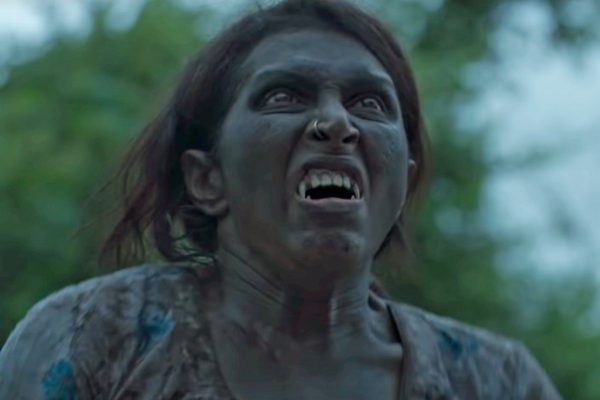Prospects begin highly with a creative, richly designed title sequence from Studio Kokaachi, the team behind Netflix’s Lust Stories, scored to a notably foreboding composition by Benedict Taylor. This time, they’re attempting to make the heart stop, rather than pump, with a quintet of Ghost Stories. Endeavouring to infuse Hindi culture into a variety of narratives, themes, and locations – it’s advisable to watch in Ghost Storie’s native language. If not only due to the English dub being excruciatingly awkward and, on occasion, half-arsed in delivery.
Ghost Stories divvies itself into four shorts, roughly twenty-five minutes or so each. All individually performed, directed, and written, there’s an absolute failure in arcing the storytelling. An anthology can indeed contain a selection of seemingly random short films, but notable feature presentations tie together their choices with an overarching structure. Deceptively long at two and a half hours, by the third story Ghost Stories feels like an unsuccessful television pilot of singular episodes. So, what spine-tingling frights await?
Firstly, if you’re able to recognise anything through Tanay Satam’s shockingly lit cinematography, Zoya Akhtar’s opening segment addresses the imbalanced respect developing between younger generations in India and their elders. Was there potential for Vijay Maurya & Ensia Mirza’s screenplay? Plenty. It’s an engaging concept which does echo cultural concerns, not only in India. As with the cinematography and direction, this first segment misses most of the marks it sets out on. It intends to offer a slow-building dread, as a young carer (Janhvi Kapoor) lives in with an ailing woman, who seems to think her son is still sleeping next door, despite being entirely alone. What culminates is a rushed, confusing ending which puts what little atmosphere had been building to squander.
Segments two and four (as none are given individual titles) are afflicted with similar issues. Upsettingly, they also share the largest waste of potential. Both contain a competent cast with an intriguing premise, with Karan Johar’s final tale the only actual ‘ghost’ story among the lot. Johar’s tale takes a contemporary approach, as newly-weds move into the family home only for the husband to talk to his deceased grandmother, including during sex. Attempts at discomfort though are dashed with the forced humour, which is completely out of place in the story. It isn’t providing levity, as the story isn’t that off-putting, and simply cheapens the potential.
So, is anything worth a watch? It’s worth a fast forward. Dibakar Banerjee’s untitled third story is a glimmering gem which deserves a far superior platform. Concise, the narrative allows for steady pacing and the only authentic chills the film produces. Arriving in a small, rural town, a man (Sukant Goel) finds the town deserted and distressed. Two young children emerge, crying for his help from the hidden villagers who remain, now zombies, but also something more. It takes it’s time and has comprehensive performances. The fear is tangible, and the zombies are just eerie enough to be off-putting without stretching into fantasy territory. The climax takes a clever, if a little on the nose turn, as the man awakens to find not everything was as it seems, but that the reality he faces may be worse.
Where horror should reflect a political or cultural climate of the day or hell, merely ensure you sleep with the lights on – Ghost Stories fails to rumble in the night and if anything, will ensure a good night’s sleep. Save for Dibakar Banerjee’s third story, which secures the film’s only worthiness, this anthology of spooky tales fails to capture the audience’s attention and perhaps more insultingly inspires little imagination.
Available on Netflix now
